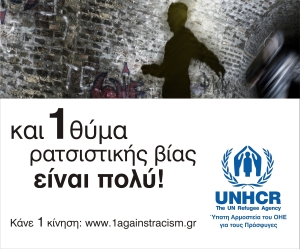RED Network Combating Racism & Xenophobia
Φεβρουάριος 8, 2011 The RED Network combating racism & xenophobia is co-funded by the European Union - Project framework: Fundamental Rights and Citizenship "Actions grants" 2009-2010 / European Commission DG Justice
The RED Network combating racism & xenophobia is co-funded by the European Union - Project framework: Fundamental Rights and Citizenship "Actions grants" 2009-2010 / European Commission DG Justice
Summary
The RED Network, is an independent research network building the RED early warning system composed of 17
Research and Civil Society Organisations in EU Member States. It aims at critically recording and fighting
stereotypes, which are the causes of racist and discriminatory attitudes, speech, actions and violent incidents. It
perceives itself as a ‘watchdog’ and a reliable source of information.
The RED project target group is ultimately the wide public for what concerns dominant or emerging public
perceptions, attitudes, misunderstandings, misinformation and intolerant stereotypes. Mainly to be accomplished
through targeting of expert publics and media operators/policy makers in order to shift or reverse and make more
efficient and relevant their response to racism and discrimination.
The general aim of the RED network - and as a consequence its major contribution - is to address the gaps in the
current socio-political state of research regarding the support of timely and effective policy responses to issues of
racism, discrimination and integration of socially marginalized minorities. RED will tackle the lack in continuous
monitoring systems and alert mechanisms on racist and discriminatory developments in selected EU countries.
It will achieve its aims by:
- Providing through the dynamic interactive tools of the RED web portal and the RED Atlas and early-warning system on racism and discrimination, fast, real-time, straight-forward information on the situation and developments, as well as on relevant policies and legislation in EU Member States. The RED system is built as an on line EU comparative tool with infinite possibilities for cross-correlating data and customisable reports, accessible to experts and the general public.
- Signalling emergencies as a ‘watchdog’ related to the development of novel social phenomena through its holistic, well documented and cross-cutting approach, in each country and in the European society as a whole.
- Promoting understanding of how racism and discrimination grows and develops by recording, analyzing and interpreting racist and discriminatory stereotypes, rhetoric, as well as the pervasiveness and transformation of these phenomena.
- Fighting, debunkering and breaking therefore the vicious circle of fear, misunderstandings and unrespectful attitudes, actions and speech present in the EU public spheres through showing their negative consequences for social cohesion and inclusion and promoting a better cross-community understanding, which helps to counter these negative developments in cooperation with expert (media) and the general public.
- Support and encourage early, informed and therefore effective design of policies, while the causes for policy change are made visible and directly perceivable to the wide public aiming at a multiple impact in the national and EU public democratic sphere.
Main deliverables – outputs:
- RED Network web portal and early-warning system. Map-based and providing straight forward information to expert and unskilled users and will be disseminated to targeted publics through e-tools, conferences and public events.
- RED Atlas of racism and discrimination in EU
An indicative list of strands:
> Racism --> racist violence & crimes | hate speech | anti-semitism | islamophobia | anti-roma | homophobia
> Discrimination --> against migrants, on grounds of ethnic origin, language, religion, sexual orientation, disability,
multiple discrimination
> Integration --> of migrants, minorities, Roma, social minorities
> Law & policies for equality
- RED breaking news/ alerts/developing now reports
- RED library of most authoritative and relevant reports sources of information and important documents for racism, discrimination and equality in the Member States
- RED thesaurus of frequent, new and old, emerging and transforming racist stereotypes of ethnic and cultural groups, migrant and social minorities who are victimised or at risk of victimisation.
RED web portal examples
Overall Goal
The RED (Rights Equality and Diversity) Network aims at combating racism, xenophobia and intolerance by creating an early-warning system on racism, discrimination, situation in the EU Member States, as well as on law and policies against discrimination racist violence, hate speech and stereotypes aiming at social integration and equality through diversity.
Main RED Network Objectives
The RED Network, will be an independent research network building the RED early warning system composed of 18 Research and Civil Society Organisations in 17 Member States. It aims at critically recording and fighting stereotypes, which are the causes of racist and discriminatory attitudes, speech, actions and violent incidents. It perceives itself as a ‘watchdog’ and a reliable source of information.
The general aim of the RED network - and as a consequence its major contribution - is to address the gaps in the current socio-political state of research regarding the support of timely and effective policy responses to the issues of racism, discrimination and integration of socially marginalized minorities.
It will achieve its aims by:
- Recording phenomena like racism, anti-semitism, Islamophobia and related intolerance and tensions fuelled by these phenomena in a reliable timely, dynamic and comparative way. The RED network aims at taking over a scientific ‘watchdog’ role by signaling emergencies related to the development of novel social phenomena through its holistic, well documented and cross-cutting approach, in each Member State and in the European society as a whole.
- Providing fast, real-time, straight-forward information on the situation and developments regarding discrimination on the grounds of race, ethnic origin and religion as well as multiple discrimination involving all these kinds of discrimination and of the related policies and legislation in EU Member States through an early-warning system, built as an on line EU comparative tool accessible to both experts and the general public. The RED network aims at filling the gap due to a lack in continuous monitoring systems and alert mechanisms on racist and discriminatory developments in selected EU countries and (cross-border) regions through real time data collection, national networking, public intervention and focused research.
- Promoting understanding of how racism and discrimination grows and develops by recording, analyzing and interpreting racist and discriminatory stereotypes, rhetoric, as well as the pervasiveness and transformation of these phenomena.
- Fighting and breaking therefore the vicious circle of fear, misunderstandings and unrespectful attitudes, actions and speech present in the EU public spheres through showing their negative consequences for social cohesion and inclusion and promoting a better cross-community understanding, which helps to counter these negative developments in co-operation with expert (media) and the general public.
- Recording and assessing the responses of the EU Member States to these developments and the impact of the measures taken on policy development concerning the promotion of equal opportunities, diversity and non-discrimination. The early warning/alert system of the RED network will benefit greatly the early, informed and therefore effective design of policies , while the causes for policy change are made visible and directly perceivable to the wide public guaranteeing a multiple impact in the national and EU public democratic sphere.
- Making visible the information available in the Member States based on the research and practical work done by the RED Network partners. The RED network therefore, aims at providing a sound basis for adapting policy perceptions, design and management aiming at the fight of social phenomena of racism, discrimination and disintegration, while reliably recording the current situation and trends in the EU Member States by providing policy makers as well as other interested stakeholders with national and EU-wide reliable, in depth and actual research.
- Promoting social cohesion and inclusion in democratic and diverse European societies through dissemination, public events and authoritative public intervention based on actual and reliable data.
- Drafting and publicly disseminating an EU-wide RED Annual report on racism, discrimination and challenges in integration and through related national conferences and workshops, supported by joint statements and common activities combating racist and discriminatory developments.
- Building an on line library of most authoritative and relevant reports sources of information and important documents for racism, discrimination and equality in the Member States.
- The RED results shall be presented in 2 International conferences and public events at a national and EU level making visible the shared research findings on issues of discrimination, integration and exclusion as well as good practices promoting social cohesion and inclusion. The RED Network remains open to associate partners as an open scientific and civil society forum.
The information provided by an interdisciplinary social science research network – including socio-legal and socio-economic research aspects will promote a holistic and unitary view still allowing for differentiations on the phenomena of racism, discrimination as well as the challenges of social inclusion faced by migrants and minorities in the Member States and on the consequences for the European Union.
The RED Network Objectives will be pursued mainly through a dynamic and interactive RED early-warning system web portal based on a comparative on line tool – atlas of racism – which will be able to provide real-time, basic, straight-forward but also customized in depth information on racism, discriminatory situations, emerging trends and stereotypes in the national and EU public sphere, accessible to both expert and general publics.
Moreover, the dissemination of its comparative results and outcomes to expert, civil society, media and general publics on a national and EU level.
Governments, researchers, policy makers and other stakeholders, media professionals, students, civil society and the general public will be the direct beneficiaries of the coordinated activities by RED network. The interactive and comparative on-line tool provided by the RED network will provide reliable up-to-date and real-time information and research findings on current situations regarding racism and discrimination on a national, regional and local level. The RED network aims exactly at using the powerful tool of primary research and data collection in order to achieve this objective. The deliverables of such activities will be unique and groundbreaking in modern scientific discussions and policy making.
The area of fundamental rights and of the protection of migrants and minorities will also benefit greatly from the formation of an independent pool of academic research and experiences of practical work on the phenomena of racism, anti-semitism, Islamophobia and related intolerance, gained in each EU Member State and closely linked to civil society.
Background problems and the EU of fundamental rights
Racism and discrimination of migrants and minorities and participation of these marginalized groups in political, economic, social and cultural rights via integration processes and the promotion of equal opportunities have a huge impact on the shaping of modern society.
The challenge of building of a modern Europe of peace and prosperity is highly dependent on how social tensions caused by racism and intolerance are dealt with especially in times of crisis and reprioritization of public funding and values.
However, EU policy makers’ knowledge of phenomena like racism, discrimination and integration on Member State level, as well as the Member States’ response to the actual situation and developments on the ground are quite often too outdated and anecdotal to form a sound basis for promoting adequate and effective EU policies and for assessing their transposition, implementation and impact.
Similarly both specialized actors and the general public refer exclusively to fragmented information disseminated by the media, often speculative or instrumental in the national political arenas leading to misrepresentations, misunderstandings, fear or intolerance challenging the social cohesion and the sustainable development of diverse democratic European societies.
Additionally, information necessary for apt policy responses to dynamically emerging situations threatening social peace in various Member States are often not readily available and therefore provided too late. Ironically, while there are many early warning systems regarding health or environmental issues, no systems exist with regard to social phenomena capable of providing early and reliable information for trends and developments which might affect the security and liberty of millions of people living in the EU which is supposed to protect its citizens against the violation of fundamental rights no matter whether they result from state action or whether they are caused by individuals or groups of individuals.
The EU Lisbon Treaty for the first time makes reference to persons belonging to minorities. It is made explicit that “respect for human rights, including the rights of persons belonging to minorities” is a value the “Union is founded on” and that is “common to the Member States in a society in which pluralism, non-discrimination, tolerance, justice, solidarity and equality between women and men prevail”. (Art. 2 Treaty on the European Union - TEU)
Besides the general obligation for the EU to combat exclusion and discrimination (Art. 3 Para. 3 TEU) after Lisbon, the EU and its bodies as well as the Member States (when implementing EU law) are bound by the Charter of Fundamental Rights (Art. 6 Para. 1 of the - TEU). The Charter underlines that discrimination on the basis of “membership of a national minority” is forbidden and that the “Union shall respect cultural, religious and linguistic diversity”. (Art. 21 and 22 of the Charter of Fundamental Rights). Finally, EU policies need to be defined and implemented “to combat discrimination based on sex, racial or ethnic origin, religion or belief, disability, age or sexual orientation”. (Art. 10 of the Treaty on the Functioning of the European Union - TFEU)
Needs and Gaps
An effective and constant process of monitoring and reporting on racist violence and attitudes, discrimination and processes of (dis)integration at a national level still remains to be established and is very much needed in order to develop policies that have a maximum impact on the improvement of social cohesion and inclusion.
Respectively, comparative EU wide approaches inevitably suffer from the lack of national contextualization.
The flow of knowledge and the dissemination of information is not even always guaranteed at the national level, while the EU level, which tries to gain a general picture and sum up the averages, often does not take into account specific regional and national aspects of the phenomena. An integrative view, providing a deeper insight into national contexts and trends, is needed as it could reveal the real dynamics and causes of current situations in the Member States.
During the first decade of the 21st century the EU has developed specific financial and legislative tools both for integration/inclusion and against discrimination on the grounds of ethnic origin and race, religion and belief, gender, age, sexual orientation, disability. However, the knowledge about the situation regarding discrimination in the Member States and the impact of EU legislative instruments remains rather superficial as long as the competent EU bodies approach the situation in the Member States on a highly abstract and too general level without taking contextual and national specificities into account.
In most of the cases the dominant analyses are extremely fragmented, either relating to a specific kind of discrimination or a distinct group affected by discrimination and based on the current legal definitions, e.g. asylum seekers, refugees, etc. Such fragmentation corresponds to a large extent to the hegemonic discourses on ‘vulnerable’ groups which are allegedly in need of distinct legal provisions and policies, a development symptomatic of an approach focusing on exclusion and discrimination.
Opposed to these current policy developments, strong currents of historical sociological theory indicate that democratic participation/integration and discrimination/exclusion strongly concern and affect ethnic-class groups and social minorities. Phenomena of discrimination and integration are causally interwoven with concepts of political participation and equality, reflecting socio-economic and socio-political inequality, which must be examined by way of a holistic-unitary approach
Finally, the high costs of a well documented EU-wide sociological research hinder the possibility for a wide spectrum of socio-legal and socio-economic analysis of integration and discrimination as a social phenomenon, its developments and trends.
Target groups
The RED project target group is ultimately the wide public for what concerns dominant or emerging public perceptions, attitudes, misunderstandings, misinformation and intolerant stereotypes. Mainly to be accomplished through targeting of expert publics and media operators/policy makers in order to shift or reverse and make more efficient and relevant their response to racism and discrimination.
This goes for both the media operators - opinion leaders (e.g. key public figures in the Member States) and the policy makers and public authorities on a national and EU level.
In this effort, the RED Network of research and the RED early-warning system will aim to:
- promoting understanding of how racism and discrimination grows and develops by recording, analyzing and interpreting racist and discriminatory stereotypes, rhetoric, as well as the pervasiveness and transformation of these phenomena.
- fighting, debunkering and breaking therefore the vicious circle of fear, misunderstandings and unrespectful attitudes, actions and speech present in the EU public spheres through showing their negative consequences for social cohesion and inclusion and promoting a better cross-community understanding, which helps to counter these negative developments in cooperation with expert (media) and the general public.
Additionally, as a multiplying factor, the RED Network and the RED system is an open platform and research forum to research and civil society organisations and networks, in order to further refine its research and public impact tools, but most and foremost to expand the academic and research readiness and engagement in countering, debunkering and efficiently deconstructing myths, stereotypes, stigmas and obstacles to democratic living together.
RED Network preparation & role
The preparation of the RED Network is ongoing in the last two years between RAXEN National Focal Points. All RED partners agreed on the particular need to report on racism discrimination and intolerance (Anti-Semitism, Islamphobia, Anti-Roma, homophobia etc.) in a timely manner. This need became even more pressing through the participation in the RAXEN network in which the RED partners provide national level reports, which however feed-in EU comparative reports not focusing on situations, developing and emerging tensions and trends on a national and/or regional level.
The RED partners as RAXEN NFPs are already performing research and monitoring tasks on a national level. However, the focus of such research is determined by the priorities set by the contracting authorities on an EU level and top-down orientation, while only part of the data they provide, feed in for EU wide reports, missing the chance for a better understanding of the development of such phenomena and the reality in EU national, regional and local societies. The FRA mandate (as the transformation of EUMC), which has been the main contracting authority of most RED partners, addresses EU situation and phenomena and does not proceed to detailed analysis and insight in national realities, therefore it does not provide country and annual reporting on racism and discrimination.
The 1st Fundamental Rights’ Platform has addressed that gap by suggesting to FRA (through the first set of recommendations to the FRA Management Board presented by the i-RED Director as elected member of the Interim Panel of the Platform in 2008) to assume a ‘watchdog’ role in addressing racism and discrimination in Member States, as well as to provide regular annual reporting. Since then, in the years to follow, FRA provides unique and valuable research on specific thematic areas of fundamental rights, as well as EU overviews on specific topics and phenomena, nevertheless leaving lacunae both in timely response (such reports are finalized and published many months after the occurrence of the phenomena) in identifying and analyzing in-depth, confronting and countering racist violence and attitudes-stereotypes on a national level.
This gap, in timely or real-time reporting and in national-regional focus of analysis, persists in the very moment that most EU governments do not provide for nation-wide monitoring and research centres on racism and discrimination phenomena. The available information and knowledge about what really and why is happening in the Member States remains very much anecdotal, coming almost exclusively from activist or media sources and is not further interpreted, contextualized, EU compared and therefore, efficiently comprehended by policy makers either on a national or EU level.
RED partners aim to build a RED Network of high requirements and impact. They will introduce their work in the network as a complementary and strengthening element to their regular research at national and local level. Their national reporting of current situation in the respective Member States within European and international level research activities and projects functions as a solid background for their participation in the RED network.
Therefore, research is already carried out by the RED network partners in the participating countries, which is either financed by themselves or by other sources. The network is seeking for fuinding to provide the necessary co-ordination and means for jointly elaborating, assessing and reviewing comparative methodologies which will bring about meaningful results, as well as exchange of research experiences, findings and views on promoting and making the best use of it in the public sphere pursuing a positive impact on modern European societies.
Innovation
The RED Network and early warning system is of unique range and a highly innovative endeavor in an effort to provide sound and timely basis for a convincing policy response to developing threats to social cohesion, integration and equality through diversity in modern EU societies.
The general aim of the RED network - and as a consequence its major contribution - is to address the gaps in the current socio-political state of research and policy planning regarding the support of timely and effective policy responses to the issues of racism, discrimination and integration of socially marginalized minorities. The RED network aims at filling these gaps due to a lack in continuous monitoring systems and alert mechanisms on racist and discriminatory developments in selected EU countries and (cross-border) regions through real time data collection, national networking, public intervention and focused research.
The main research tool through which the RED network will become active is the capacity of its partners to provide reliable up-to-date and real-time information and research findings on current situations regarding racism and discrimination on a national, regional and local level. The RED network aims exactly at using the powerful tool of primary research and data collection in order to achieve this objective. The deliverables of such activities will be unique and groundbreaking in modern scientific discussions and policy making.
The most uniquely innovative component of the RED earsly warning system will be its interactive on line comparative tool which will allow for real-time updated and dynamic user-friendly comparative information on racism and xenophobia in European countries. The RED system will be based on assessment of the situation and trends in EU countries regarding racism, discrimination, intolerance and integration-equality which will be reflected to colored Europe maps and capacity to obtain more detailed comparisons, information and in-depth explanatory and contextual information, as well as links to sources of authoritative information. Such classification will be done through the main strands of racism, discrimination, integration and law & policies for equality.
In particular:
The RED Atlas web portal will provide infinite possibilities for cross-correlating data and comparing countries, time trends and different strands, producing ready-to-use reports of the searches for any use (therefore the format may vary as it may include also unique and user customisable html products. Additionally, it will achieve a holistic and not fragmented approach through a unique bird-eye and map-based view of the racism, discrimination and intolerance phenomena and trends in the EU territory and reginal realities, while based and with the potential of in-depth information and data on a scale of national EU Member State and local realities. Holistic is intended as recording and efficientlyreporting racismand discrimination in a responsive and comparative way irrespective the grounds of victimisation and discrimination and the social group victimised, or the local, national, regional level and in relation to time, gravity, duration and policy response.
The RED library will be built through the RED system input activity, achieving a unique unitary view of the most authoritative and relevant reports sources of information and important documents for racism, discrimination and equality in the Member States. The selected and outstanding data which compose the library of the most important documents are input in a cost-effective way through the RED input.
RED Thesaurus is a unique collection and a dictionary of of most frequent, new and old, emerging and transforming racist stereotypes, stigmatising and labelling of ethnic and cultural groups, migrant and social minorities who are victimised or at risk of victimisation in the member States. This highly innovative deliverable will be based on selected data which are input in a cost-effective way through the RED system input activity by the RED Network partners.
The RED Network aims at achieving these objectives through the added value and increased impact of joining forces in disseminating and exchanging research results and information on policy debates. The RED network is a response to the need to build intra-disciplinary partnerships in order to achieve a unitary view still allowing for differentiations on relevant current social phenomena. The information provided by an interdisciplinary social science research network – including socio-legal and socio-economic research aspects will promote a holistic and unitary view still allowing for differentiations on the phenomena of racism, discrimination as well as the challenges of social inclusion faced by migrants and minorities in the Member States and on the consequences for the European Union.
The two-fold approach of a combined scientific and public outreach could give way to a new kind of change management related to policy making, as today’s public policies aiming at the promotion of equal opportunities and diversity have a low impact and public and scientific discussions related to the respect of fundamental rights and social phenomena like racism and discrimination are currently faced by low interest.
This is crucial in modern European times of heavy economic crisis and the awakening of far-right forces and public attitudes in almost all the EU countries.
RED Network under construction
The main organisational structures of the RED Network will be:
- The coordination and management of the RED network by the Institute for Rights, Equality & Diversity (i-RED), backed by RED network partners, in providing focused expert support for respective work streams and deliverables.
- A Steering Group composed of six RED partners/senior experts who will coordinate the implementation of the RED network and the research work streams and will be responsible for quality control, the steering group will be led by i-RED.
- The Research RED network partners will actively participate in the development, assessment and review of the research, in the development of comparative tools, methodologies and common definitions guaranteeing comparability and reliability of results.
- The Open RED network forum, which will not only include RED partners but also future associate partners who want to join the RED endeavor and further strengthen its work and impact especially through encouraging the engagement of cross-community civil society organizations, in which RED partners already have a stronghold and are active in networking.
- The Research RED partners and the Steering Group will form the plenary of the RED network and will contribute to making the RED methodology, results and outcomes reliable.
RED Network activities and products - RED Atlas of Racism and Discrimination - RED Early warning system
- RED system input: Input of data from RED Network partners in the RED early-warning system on racism, discriminatory situations, emerging trends and stereotypes in the national and EU public sphere, accessible to both expert and general publics. Below follows an indicative list of strands on providing input for the RED Atlas:
- Racism --> racist violence & crimes | hate speech | anti-semitism | islamophobia | anti-roma | homophobia
- Discrimination --> against migrants | on grounds of religion | against linguistic minorities | against Roma | on grounds of sexual orientation | on grounds of disability | on grounds of ethnic origin | Multiple discrimination |
- Integration --> of migrants | of minorities | of Roma | of social minorities |
- Law & policies for equality --> racist violence | hate crime | discrimination | integration
For each strand, RED partners will also provide:
- Critical & emerging trends and best policy responses - law and administrative practices
- Assessment of trends (imrpovement-deterioration-stability)
2. RED Atlas launch: Launch and public presentation of the RED early-warning system / RED Atlas
The above activities will provide the on line RED Atlas, the RED Library and the RED Thesaurus.
The RED Atlas web portal will provide infinite possibilities for cross-correlating data and comparing countries, time trends and different strands, producing ready-to-use reports of the searches for any use (therefore the format may vary as it may include also unique and user customisable html products. Additionally, it will achieve a holistic and not fragmented approach through a unique bird-eye and map-based view of the racism, discrimination and intolerance phenomena and trends in the EU territory and regional realities, as well as on best policy responses and good law and administrative practices, while based and with the potential of in-depth information and data on a scale of national EU Member State and local realities. Holistic is intended as recording and efficiently reporting racism and discrimination in a responsive and comparative way irrespective the grounds of victimisation and discrimination and the social group victimised, or the local, national, regional level and in relation to time, gravity, duration and policy response.
3. The RED library will be built through the RED system input activity, achieving a unique unitary view of the most authoritative and relevant reports sources of information and important documents for racism, discrimination and equality in the Member States. The selected and outstanding data which compose the library of the most important documents are input in a cost-effective way through the RED input.
4. RED Thesaurus is a unique collection and a dictionary of of most frequent, new and old, emerging and transforming racist stereotypes, stigmatising and labelling of ethnic and cultural groups, migrant and social minorities who are victimised or at risk of victimisation in the member States. This highly innovative deliverable will be based on selected data which are input in a cost-effective way through the RED system input activity by the RED Network partners.
5. RED readiness: All RED Network national research partners provide a regular update of the RED early-warning system, especially through real-time, straight-forward information on the situation and developments regarding discrimination on the grounds of race, ethnic origin and religion as well as multiple discrimination involving all these kinds of discrimination and of the related policies and legislation in EU Member States.
RED Reporting
EU comparative (with a focus on the specific Eu countries) Reports on the RED Atlas findings will be produced and disseminated in month 12 and 24 of the RED Network Project.
- RED Atlas Reporting
- RED Breaking news reporting
Breaking news reporting will focus on real-time provision fo basic and contextual information on developing phenomena of racism (especially of racist violence and hate speech) in specific national and/or regional level in order to allow for timely policy response and public awareness. Particular focus will be given to stereotypes and to their debunkering through authoritative sources of research information aiming to breaking the vicious circle of racist attitudes and discrimination in the political discourse, media and the wide public especially on a national level.
The number of such reports is undefined since the eruption of such phenomena may not be forecasted, while still we know that they become all the more frequent in many EU countries, especially those represented by RED Network partners in this proposal.
It goes noted that the RED project does not intend to provide merely a media-like notification or empty criticism regarding racism and critical situations and events but to obtain a more reliable well documented information and signal early enough critical situations, while also indicating in which country policy response has been better or improving. Therefore the RED Network is focussing also on good practices in direct connection and as a response to real and urgent problems and not as in-vitro solutions which have not been proven on the ground. This is the reason RED portal users may obtain map-based comparative information in RED readiness and alert interface both on incidents. Critical situations and on positive and efficient policy responses. This will provide unique groundbreaking possibilities to identify, compare and easily evaluate problems and responsive, efficient policies, which may improve the impact of legislation and state practices in the area, which is currently not at the level desired and set by EU and national policies.
Dissemination Strategy
The RED project target group is ultimately the wide public for what concerns dominant or emerging public perceptions, attitudes, misunderstandings, misinformation and intolerant stereotypes. However, while still unskilled internet users may be direct beneficiaries and users of the RED system, this is mainly expected to be accomplished through targeting of expert publics and operators/policy makers in order to shift considerably or to reverse and make more efficient and relevant their response to the racism and discrimination phenomena. This goes for both the media operators - opinion leaders (e.g. key public figures in the Member States) and the policy makers and public authorities on a national and EU level.
Additionally, as a multiplying factor, the RED Network and the RED system is an open platform and research forum to research and civil society organisations and networks, in order to further refine its research and public impact tools, but most and foremost to expand the academic and research readiness and engagement in countering, debunkering and efficiently deconstructing myths, stereotypes, stigmas and obstacles to democratic living together.
The dissemination strategy is developed around the RED system web portal. The RED project is developed in four phases, where the first year is the set up and tuning of e-tools and research data and the second is dedicated to launch of the RED system potential and to its public impact to targeted publics in the national and the EU public sphere.
The main tools for dissemination and raising awareness on racism, xenophobia and intolerance in EU will be:
The RED Atlas web portal, which will provide infinite possibilities for cross-correlating data and comparing countries, time trends and different strands, producing ready-to-use reports of the searches for any use (therefore the format may vary as it may include also unique and user customisable html and other e-products. Additionally, it will achieve a holistic and not fragmented approach through a unique bird-eye and map-based view of the racism, discrimination and intolerance phenomena and trends in the EU territory and regional realities, while based and with the potential of in-depth information and data on a scale of national EU Member State and local realities.
The RED library, built through the RED system input activity, achieving a unique unitary view of the most authoritative and relevant reports sources of information and important documents for racism, discrimination and equality in the Member States. The selected and outstanding data which compose the library of the most important documents are input in a cost-effective way through the RED input.
The RED Thesaurus as a unique collection and a dictionary of of most frequent, new and old, emerging and transforming racist stereotypes, stigmatising and labelling of ethnic and cultural groups, migrant and social minorities who are victimised or at risk of victimisation in the member States. This highly innovative deliverable will be based on selected data which are input in a cost-effective way through the RED system input activity by the RED Network partners.
The RED system visibility shall be supported by follow-up and communication services to be provided to expert and simple users of the RED system and the Atlas results in order to manage and assure an efficient impact and achievement of the project's objectives. This is expressed through readiness of i-RED and all RED Network partners to provide follow-up information and clarifications upon request. Practically, the possibilities for diverse, fully/highly customised communication products (easy toproduce-automatic based press releases/leaflets/presentations) are infinite leading to a further refinement and therefore more effective, communication strategy, which is tailro-made, client-user/centered and developed upon request through the RED web portal e-tools. Therefore, it is expected that such taskas are not going to be too demanding given the self-explanatory and highly customisable on - line tools of the RED web portal.
All RED Network partners will guarantee a contact list which will feed-in the RED system e-mail list until Month 11 for the RED system launch and will continue to provide throughout the project additional contacts obtained after the impact of the RED system public launch. Building a database of RED interested actors, stakeholders and civil society organisations - which will be composed by national databases to be collected and updated by RED national partners- will feed-in the RED awareness. For each national partner the objective will be to collect 700-1000 contacts (depending on country) - media organisations and operators, organisations, public key-figures, civil society, authorities, academics.
RED SG and main experts focus on the communication impact and the press visibility in building a strong RED system profile. An earlier dissemination meeting with key European politicians will be pursued, eventually with the support of the EU Commission, in order to explain the RED project, scope and importance and to build political support. Additionally, RED Network partners will pursue networking with key public figures on a national level as preferential and early information recipients in order to build the national profiles of the RED Atlas and system.
The future of the RED Network and the RED system
The urging need in modern Europe and the sustainability of an early-warning system and research network have been among the main factors for the RED network partners to join this specific proposal. Most EU countries are reluctant to fund and to sustain in time similar initiatives and research centres, often hiding behind the severe underreporting of victimization and racist incidents and attitudes in their territory. For example, the EU-MIDIS survey from FRA, indicating shocking percentages of underreporting discrimination by victim groups – in most cases more than 90% of victims do not report racism and discrimination because of lack of trust that anything will change for them or the situation, or because they don’t even know that there are competent public authorities to take on their complaint.
However, racism and discrimination do exist, they rapidly develop, transform and are diffused in most EU countries threatening social cohesion and shaping counterproductive and not sustainable social relations and potentially problematic or even segregated societies. This is why since the last 2-3 years the RED partners under the initiative and coordination of i-RED initiated the building of the RED Network.
The RED Network partners assume that the major effort to fund the RED system is to build its foundations, and especially, to work on a robust comparative methodology, concepts and definitions, and to set up the network and its e-tools which provide for its communicative power and impact. The RED Network project aims at a high visibility and public impact of the RED system and the RED Atlas.
Therefore, it is anticipated that future phases of the RED Network will be marked by:
a- Cost-effective and not budget demanding actions, which will build on the existing RED system structure, methodologies and tools. The RED system may continue to provide reliable and important results, after the end of EU funding through the versatile e-tools and the robust methodology, even reducing the depth of analysis and reporting most major situations and trends in European countries.
b- Enlargement of the Network with research and other partners, enabling them to feed-in information and achieve an even higher level of in-depth, solid and comparative real-time, trends and overview of racism and discrimination in Europe. open platform for interaction, data comparison among experts, academic and civil society organisations contributing to a more comprehensive, well documented and exhaustive overview and monitoring of the socio-economic and socio-political situation regarding rights of distinct social groups and minorities in each Member State and in the European Union. It is possible for any interested country and organisation active in the protection of fundamental rights to join the RED network’s Actions.
But most and foremost,
c- Possible extension of the purpose and scope of the RED system, in relation to the addition of strands and submetric categories, such as more detailed group victimisation and reporting on fundamental rights: e.g.children rights, unaccompanied minors, disaggregated reporting on different LGBT categories, disability categories, local realities based on population or economy size and so on. The RED system potential for a real-time and comprehensive overview with a meaningful blending of socio-legal and factual indicators on the social situation and on effective respect and enjoyment of fundamental rights in Europe is enormous. Once set up and achieved public impact, the RED network and system would reliably seek funding from relevant sources, public or private, national and EU level. Communication tools and staff during the preparation of the RED system and Atlas launch will be used in order to obtain political support and put the basis for further funding of the RED system. In particular, the sustainability options for the future of the RED system comprise also fund raising from private economic sector of social responsibility in joint initiatives for equality through diversity with social partners and networks on an EU level. Such initiative is of fundamental importance for an economic recovery that would address and heal the social negative effects of the crisis and would lay down the conditions for a future productive and inclusive societies in national Member States and Europe.
 The RED Network combating racism & xenophobia is co-funded by the European Union - Project framework: Fundamental Rights and Citizenship "Actions grants" 2009-2010 / European Commission DG Justice
The RED Network combating racism & xenophobia is co-funded by the European Union - Project framework: Fundamental Rights and Citizenship "Actions grants" 2009-2010 / European Commission DG Justice
ΔΗΜΟΣΙΕΥΣΗ
-
 i-RED Ετήσια Έκθεση 2011
i-RED Ετήσια Έκθεση 2011
Μάρτιος 25, 2012
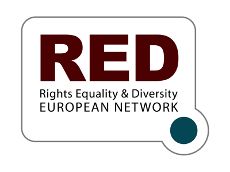
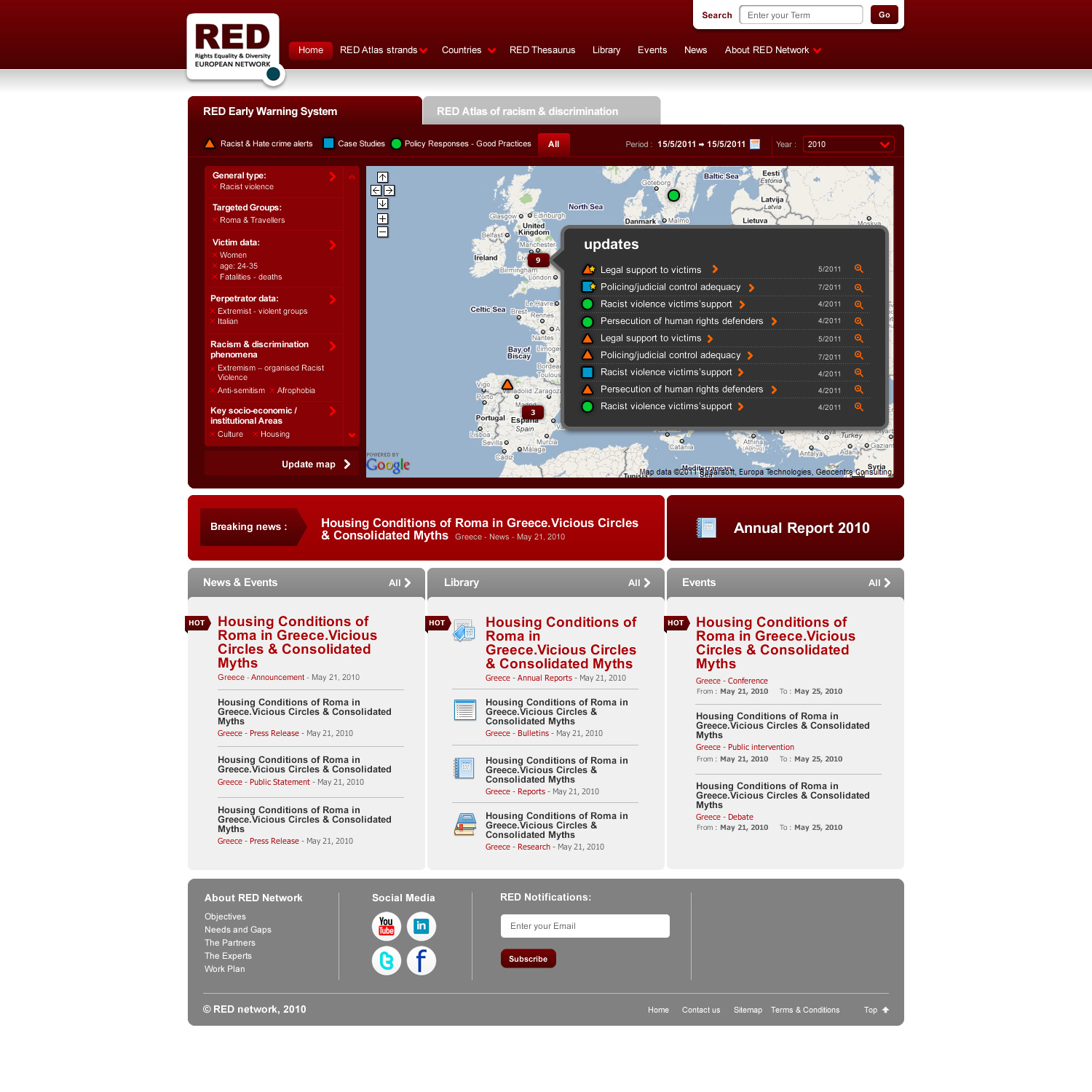
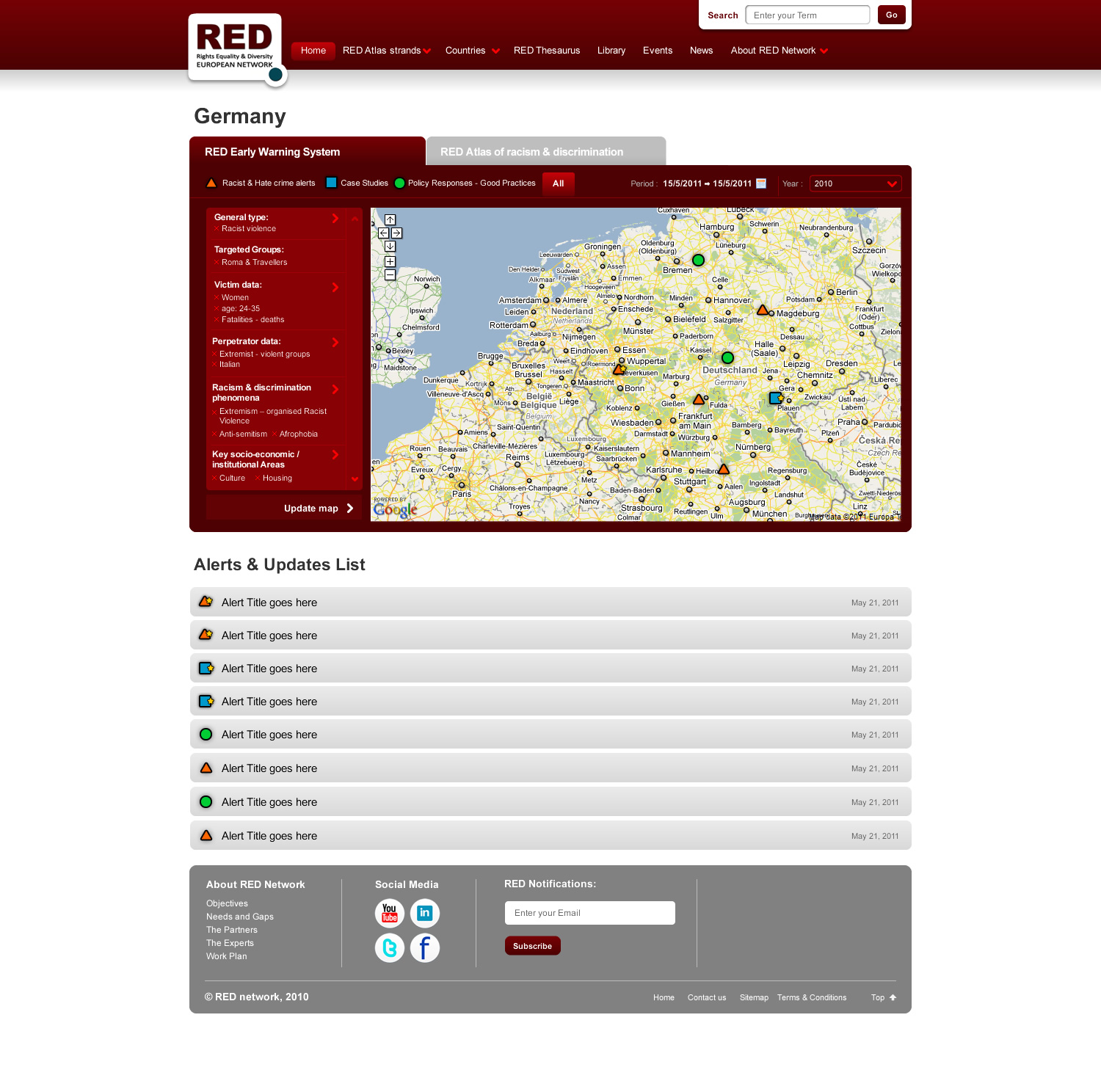
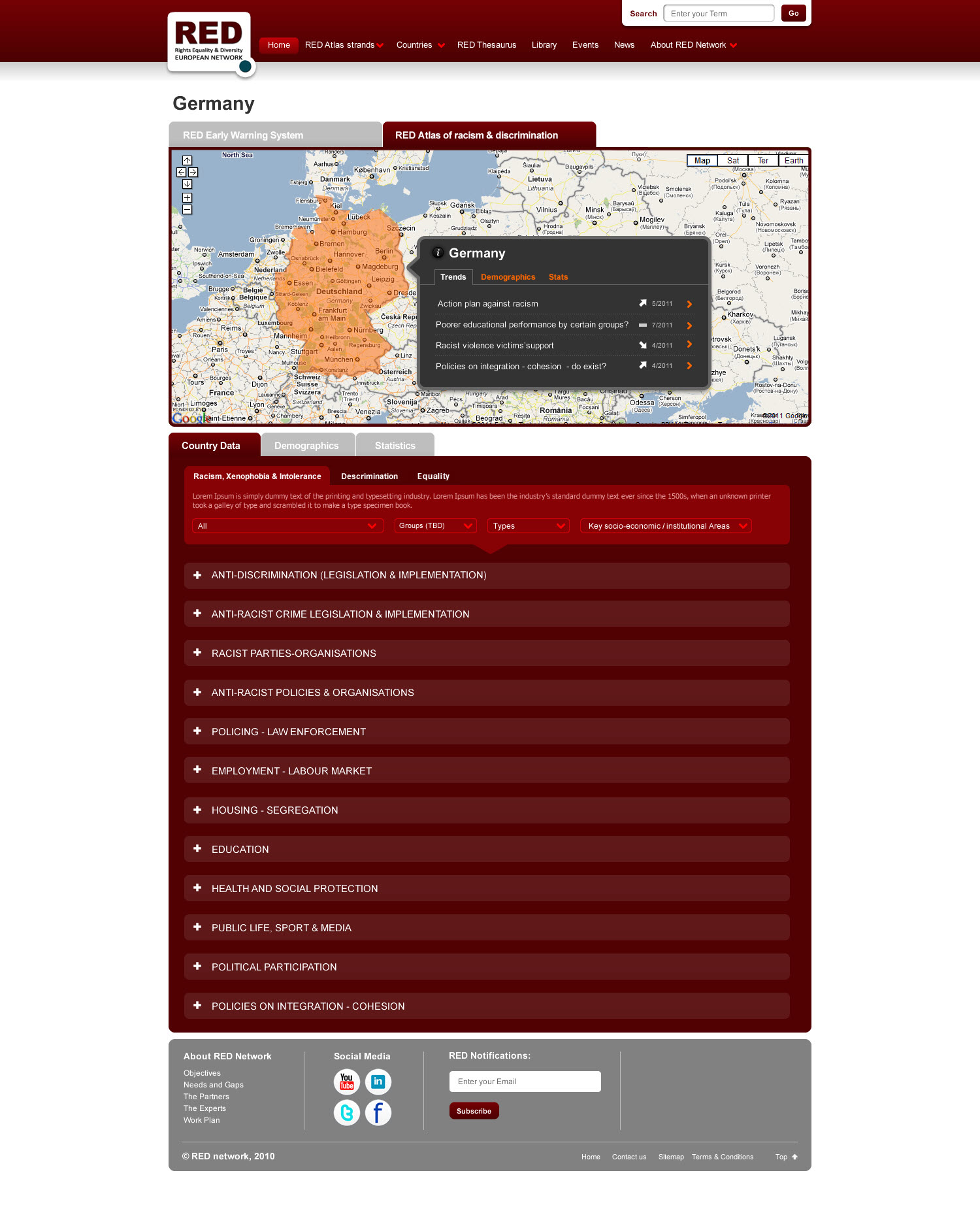
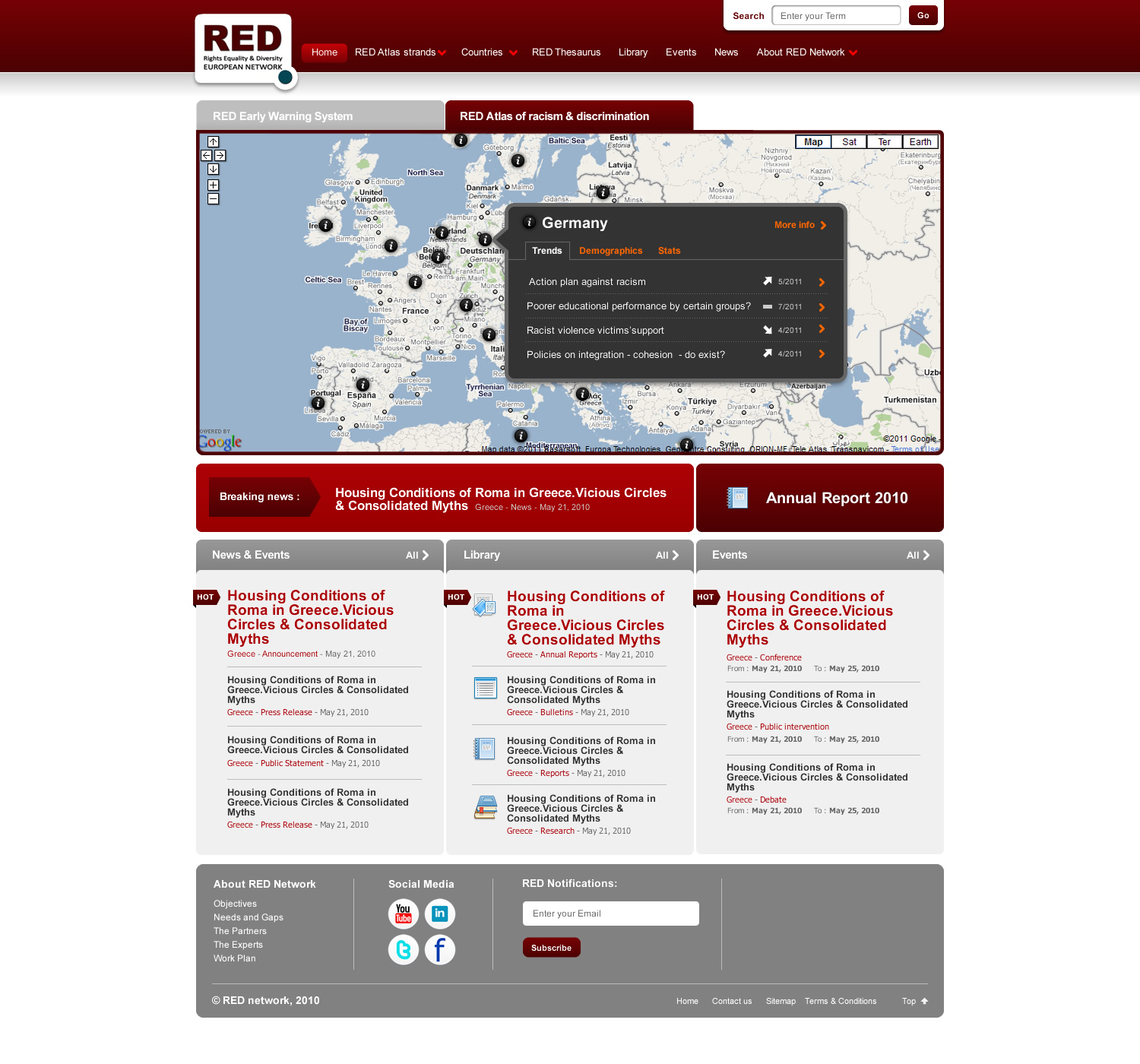
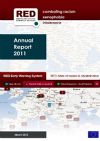 RED Annual Report 2011
RED Annual Report 2011
